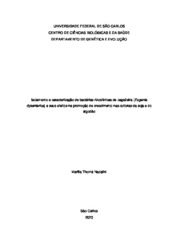Isolamento e caracterização de bactérias rizosféricas de cagaiteira (Eugenia dysenterica) e seus efeitos na promoção de crescimento nas culturas da soja e do algodão
Abstract
Brazil occupies a prominent position in the global agricultural scenario, being the world's largest producer of soy, the main crop of Brazilian agribusiness, and the world's fourth largest producer of cotton. However, the presence of acidic and low fertility soils, combined with the quest to increase productivity, make Brazil the largest consumer of fertilizers, which increases production costs and generates environmental impacts. In this context, the use of microorganisms that promote plant growth is an important ally in agriculture, helping to mobilize and transport nutrients to the plant and also to tolerate biotic and abiotic factors. This work aims to verify the existence of bacteria that promote plant growth among isolates from the rhizosphere of cagaiteira (Eugenia dysenterica), a specie native of the savannah, found in regions with acidic soils and poor in nutrients, already used for bioprospecting microorganisms of biotechnological interest. The isolates that showed fast growth were submitted to an in vitro test to verify their ability to fix atmospheric nitrogen (N2), solubilize phosphate and potassium, and produce siderophores and biofilm. Based on in vitro analyses, bacteria 02, 04 and 06 were selected for tests in a greenhouse on soy and cotton crops. The biometric parameters height, aerial fresh mass, aerial dry mass, root dry mass, number and mass of pods for soy plants were evaluated at the end of the in vivo experiment. Isolate 02 promoted an increase of 35.63% in the root dry mass of cotton plants, while those inoculated with isolate 06 obtained an increase of 32.73%. Soy plants inoculated with bacteria 02 and 04 showed an increase of 13.33% and 11.67%, respectively, in the number of pods. The other evaluated parameters did not show statistically significant difference between treatments. From the results obtained, it can be seen that the interaction between plant and microorganisms varies according to the plant species and, furthermore, that the positive effects observed may be correlated to the ability of these microorganisms to fix N2, to solubilize phosphate and potassium and to produce biofilm and siderophores.
Collections
The following license files are associated with this item:

